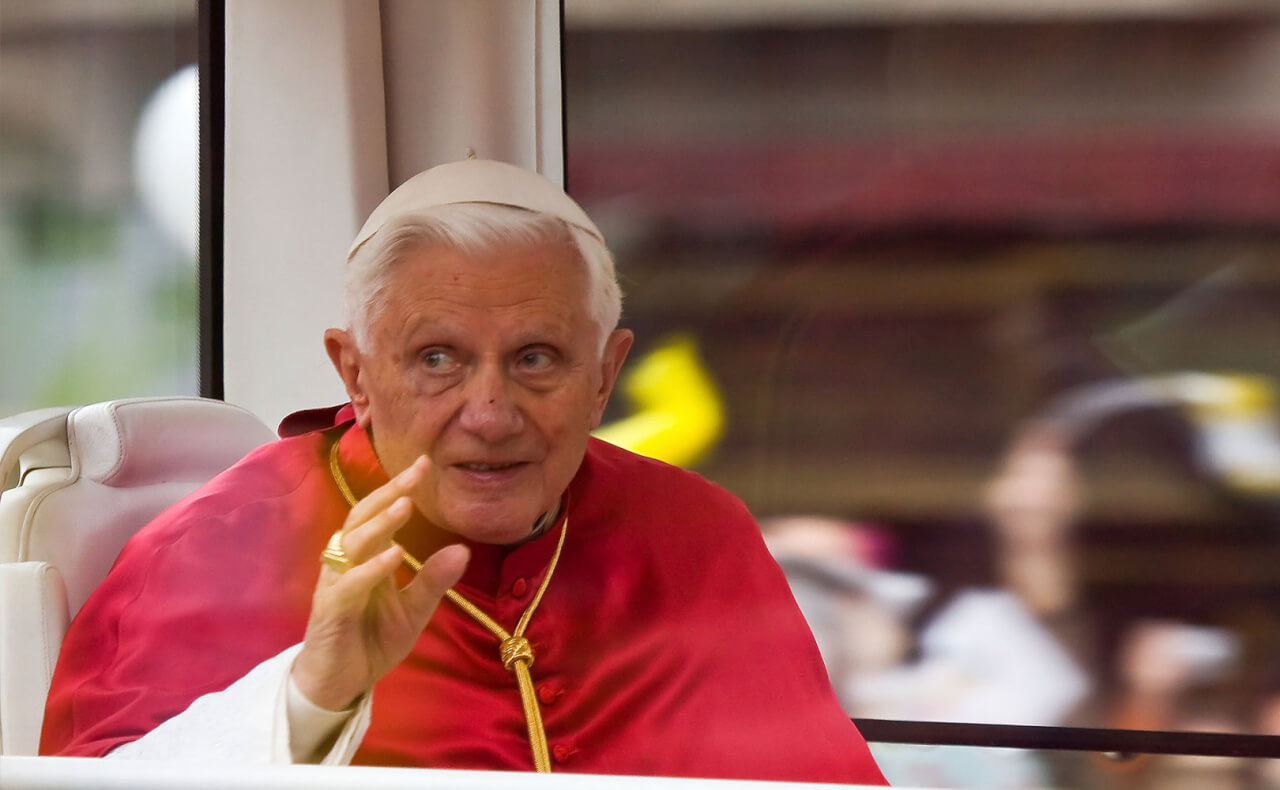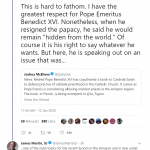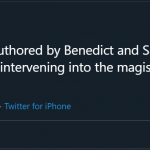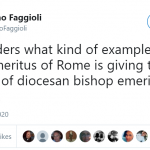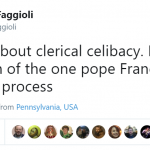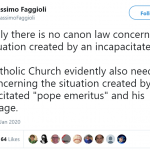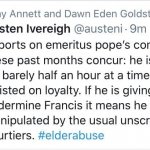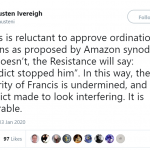It has been less than 24 hours since the news broke about the book arguing in favor of priestly celibacy co-authored by Pope Emeritus Benedict XVI and Cardinal Robert Sarah, and it seems to be the thing everyone is talking about across Catholic social media.
Many see the book and its premise as a direct statement of opposition to the agenda of Pope Francis, who has been associated with the push to end clerical celibacy in the Amazon region since before the Amazon Synod itself even began. One German Catholic journalist even predicted, almost two years ago, that “the attack on celibacy” would be the “dominant theme of the second part of this papacy.” His prediction was predicated upon a 2017 papal interview in which Francis proposed reflection about the ordination of the so called “viri probati” — proven men who, although married, might be considered worthy of being given more clerical duties in areas where priest shortages exist.
But Francis, of course, is clever. He said at the time that “voluntary celibacy is not the answer” — a phrase he has repeated over time, despite the hard push for married priests taken during the synod itself. This is a theme that the Vatican is returning to today in the wake of the controversy over the new book by Benedict and Sarah.
In comments to CNA, a Vatican spokesman said today:
Pope Francis’ position on priestly celibacy is “known,” quoting the pontiff’s remarks in a January 2019 press conference, in which he said he does not agree with making priestly celibacy “optional” in the Latin rite. …
In his statement, Bruni quoted Pope Francis’ comments aboard the papal plane to Rome from Panama Jan. 28, 2019, in which he said “personally, I think that celibacy is a gift to the Church. I would say that I do not agree with allowing optional celibacy, no.”
The pope added at the time that he thinks there is room to consider some exceptions for married clergy in the Latin rite “when there is a pastoral necessity” in remote locations due to lack of priests, such as in the Pacific islands.
Bruni’s statement also noted Francis’ quotation of the words of St. Pope Paul VI: “I prefer to give my life before changing the law of celibacy.”
The CNA report goes on to characterize the controversy over the new book as follows:
The announcement of the book’s publication prompted reports that by arguing in favor of priestly celibacy, Benedict XVI has placed himself in opposition to Pope Francis, who is right now considering allowing an exception to priestly celibacy by the ordination of proven married men, so-called viri probati, in the Amazon region in response to severe priest shortages.
So is there a conflict, or isn’t there? And perhaps more importantly, what do Benedict and Sarah think?
There is a key phrase in the introduction to the book, as excerpted by Le Figaro, that immediately caught my attention:
In recent months, as the world has been resounding with the uproar created by a strange media synod that took the place of the real synod, we have met together. We have exchanged our ideas and concerns.
The implication here is that there is a “real” synod and a synod that has been misrepresented to the public by the media. Whether it is meant that progressives misrepresented the synod by characterizing it as too forward or publications that opposed its progressive agenda did so by way of exaggeration is not clear from the context. Nevertheless, when I quoted this line, a couple of people made note that it was redolent of something Pope Benedict had said before.
He had previously made note, regarding the Second Vatican Council, of a media council and a real council. I recalled having heard this, so I looked it up, and having found it, I must admit, I am concerned that this is a real interpretative key.
Here is the statement in question, which I will excerpt in its full context from the address given by the former pope at his meeting with the parish priests and clergy of Rome on February 14, 2013 (my emphasis added):
I would now like to add yet a third point: there was the Council of the Fathers — the real Council — but there was also the Council of the media. It was almost a Council apart, and the world perceived the Council through the latter, through the media. Thus, the Council that reached the people with immediate effect was that of the media, not that of the Fathers. And while the Council of the Fathers was conducted within the faith – it was a Council of faith seeking intellectus, seeking to understand itself and seeking to understand the signs of God at that time, seeking to respond to the challenge of God at that time and to find in the word of God a word for today and tomorrow — while all the Council, as I said, moved within the faith, as fides quaerens intellectum, the Council of the journalists, naturally, was not conducted within the faith, but within the categories of today’s media, namely apart from faith, with a different hermeneutic. It was a political hermeneutic: for the media, the Council was a political struggle, a power struggle between different trends in the Church. It was obvious that the media would take the side of those who seemed to them more closely allied with their world. There were those who sought the decentralization of the Church, power for the bishops and then, through the expression “People of God”, power for the people, the laity. There was this threefold question: the power of the Pope, which was then transferred to the power of the bishops and the power of all — popular sovereignty. Naturally, for them, this was the part to be approved, to be promulgated, to be favoured. So too with the liturgy: there was no interest in liturgy as an act of faith, but as something where comprehensible things are done, a matter of community activity, something profane. And we know that there was a tendency, not without a certain historical basis, to say: sacrality is a pagan thing, perhaps also a thing of the Old Testament. In the New Testament it matters only that Christ died outside: that is, outside the gates, in the profane world. Sacrality must therefore be abolished, and profanity now spreads to worship: worship is no longer worship, but a community act, with communal participation: participation understood as activity. These translations, trivializations of the idea of the Council, were virulent in the process of putting the liturgical reform into practice; they were born from a vision of the Council detached from its proper key, that of faith. And the same applies to the question of Scripture: Scripture is a book, it is historical, to be treated historically and only historically, and so on.
We know that this Council of the media was accessible to everyone. Therefore, this was the dominant one, the more effective one, and it created so many disasters, so many problems, so much suffering: seminaries closed, convents closed, banal liturgy … and the real Council had difficulty establishing itself and taking shape; the virtual Council was stronger than the real Council. But the real force of the Council was present and, slowly but surely, established itself more and more and became the true force which is also the true reform, the true renewal of the Church. It seems to me that, 50 years after the Council, we see that this virtual Council is broken, is lost, and there now appears the true Council with all its spiritual force. And it is our task, especially in this Year of Faith, on the basis of this Year of Faith, to work so that the true Council, with its power of the Holy Spirit, be accomplished and the Church be truly renewed. Let us hope that that the Lord will assist us. I myself, secluded in prayer, will always be with you and together let us go forward with the Lord in the certainty that the Lord will conquer. Thank you!
If he’s drawing on the same analogy with the Amazon Synod, it would seem logical to conclude that he sees the same dichotomy in play: that the worst things the Amazon Synod purportedly proposed were in fact not truly the synod’s intent, but only a misrepresentation by journalists — perhaps journalists both for and against that purported agenda, and that the true synod was an act of faith.
If this is so, does that mean that the former pope and the cardinal-prefect of the Congregation for Divine Worship believe that the Amazon Synod was in fact conducted righteously, and they are merely seeking to bolster what they believe it intended by this work?
Or are they playing a diplomatic game, calling the bluff of Francis when he says he does not support voluntary celibacy, telling the world they only agree with him and are helping him to combat false portrayals of yet another of his pet synods?
It’s not possible at this juncture to be certain, but it bothers me that we have to decrypt and decode what is transpiring here, when Our Lord admonished us to let our yes be yes and our no be no. It is significant for the former pope to speak up as he is here, but without greater clarity on just what it is that he’s saying, and whether he’s truly taking a side or merely defending a critical ecclesiastical discipline, it’s hard to know exactly what it means.
There are also certainly, it should be noted, far more significant things that the pope emeritus can (and should) have targeted if he chose this as a moment of opposition, not least of which would be allowing Communion for the “remarried,” the deeply problematic Abu Dhabi statement, and the change on the Church’s perennial teaching on the moral permissibility of the death penalty in the new Catechism.
Whatever its intent, we can certainly see, at least by the public reactions of some notable papal sycophants, that the new book is being viewed by their camp as a finger to the eye of their beloved leader. Their cries of horror and disgust are almost amusing. A sampling:
Like so many other notable ecclesiastical events of the past sevenyears, this one is proving to be quite a Rorschach test. I can only advise that we refrain from reading too much into it until more is known.

